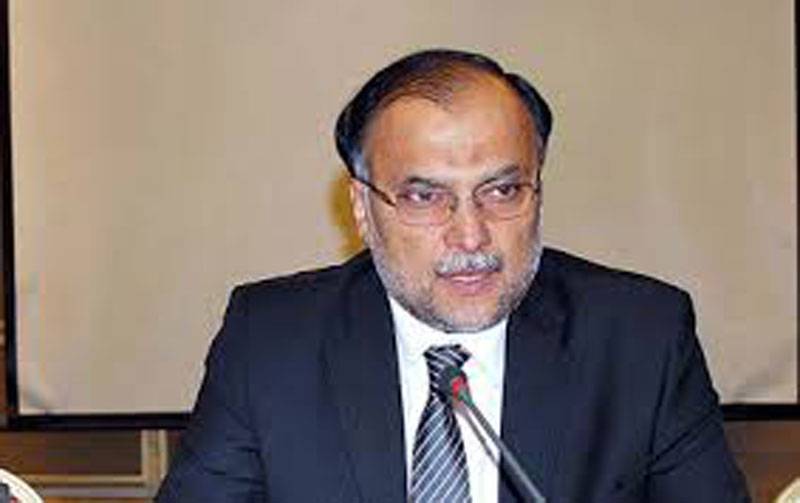Islamabad - The Planning Commission along with different stakeholders organised a conference on Friday to mark World Water Day 2015, focusing on this year’s global theme ‘Water and Sustainable Development - Role of Youth for Sustainable Water Resource Management.’
The conference was aimed at sensitisation of key stakeholders on critical water issues and challenges; engaging stakeholders especially youth; advocating with the government of Pakistan for approval of National Water Policy and building consensus for the adoption of Islamabad Water Day Declaration 2015.
The conference was organised in collaboration with World Youth Parliament of Water (WYPW), UNESCO, Pakistan Council of Research in Water Resources (PCRWR), Pakistan Water Partnership (PWP), International Centre for Integrated Mountain Development (ICIMOD), Economic Cooperation Organisation Science Foundation (ECOSF), Asian Development Bank (ADB), UNICEF, FAO-UN, UN-HABITAT, Plan International, Muslim Aid, Helping Hand for Relief and Development, GLOF Pakistan, UNDP, RSPN, ICARDA, Riphah University and WaterAid.
Speaking at the inaugural session, Prof Ahsan Iqbal, minister of planning, development and reforms, said water is the key element for the socio-economic development of any country. He said, “We must not view sustainability only as a problem of science, engineering or economics; it is also founded on values, ethics, and the equal contributions of different cultures. Our country is blessed with human capital in the form of youth which comprises about 50 percent of the population and engaging youth for integrated water resource management must be a foremost part of our water resources strategy.”
While quoting Dr Mahbubul Haq, he said: “Sustainable development is a question of quality of life for the rich countries but is question of life for the poor countries.”
Bart Devos, President of World Youth Parliament for Water, said, “Access to clean water and sanitation as well as water scarcity are among the most pressing challenges for my generation. The creation of Pakistan Youth Parliament for Water will contribute to unlocking the potential of Pakistani young people as solution provider for the water problems.”
In her opening remarks, Vibeke Jensen, representative/ director UNESCO Islamabad, highlighted that a total of 748 million people worldwide still do not have access to improved drinking water sources and quality water. While highlighting the critical role that youth can play in participating in developing their countries in a sustainable manner she also stressed the academia to pay more attention to water research and its sustainable management. She mentioned that UNESCO supports research and concrete projects on water related issues through its International Hydrological Programme (IHP), which is the only intergovernmental programme of the UN system devoted to water research, water resource’ management, and education and capacity building.
Sardar Tariq, chief executive of Pakistan Water Partnership, while delivering a message on behalf of President Islamic Republic of Pakistan said that investments in water and sanitation services results in substantial economic gains. He expressed that water is crucially important for the socio-economic sustenance and development of any country especially for Pakistan that has agriculture based economy. He mentioned that water resources of the country are subject to all kinds of quantitative and qualitative issues, which need to be addressed on priority basis.
Earlier, the Ambassador of Tajikistan Sher Ali, Cooperation Attache of French Embassy, Olivier Huynh-Van and, Dr Manzoor Hussain Soomro, President ECOSF, Mukta Akter Representative of GWP Bangladesh also addressed the gathering.
Saturday, April 20, 2024
Water key element for socio-economic uplift: Ahsan
World Water Day

Pak economy improving, funds will be provided on request: IMF
9:57 PM | April 19, 2024
Minister advocates for IT growth with public-private collaboration
9:57 PM | April 19, 2024
Judges' letter: IHC seeks suggestions from all judges
9:55 PM | April 19, 2024
Formula 1 returns to China for Round 5
9:05 PM | April 19, 2024
Germany head coach Julian Nagelsmann extends contract till 2026 World Cup
9:00 PM | April 19, 2024
A Tense Neighbourhood
April 19, 2024
Dubai Underwater
April 19, 2024
X Debate Continues
April 19, 2024
Hepatitis Challenge
April 18, 2024
IMF Predictions
April 18, 2024
Kite tragedy
April 19, 2024
Discipline dilemma
April 19, 2024
Urgent plea
April 19, 2024
Justice denied
April 18, 2024
AI dilemmas unveiled
April 18, 2024
ePaper - Nawaiwaqt
Advertisement
Nawaiwaqt Group | Copyright © 2024





